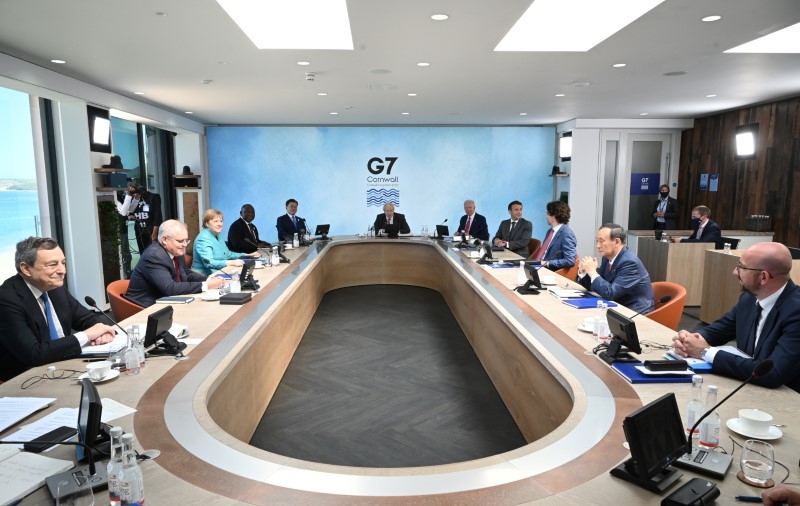CARBIS BAY, England—Group of Seven (G-7) leaders agreed on Sunday to raise their contributions to meet an overdue spending pledge of $100 billion a year to help poorer countries cut carbon emissions and cope with global warming, but campaigners said firm cash promises were missing.
Alongside plans billed as helping speed infrastructure funding in developing countries and a shift to renewable and sustainable technology, the world’s seven largest advanced economies again pledged to meet the climate finance target.
But climate groups said the promise made in the summit’s final communique lacked detail, most importantly a figure for the increases. A spokesman for British Prime Minister Boris Johnson said individual nations were expected to set out the size of the increases “in due course.”
In the communique, the seven nations—the United States, Britain, Canada, France, Germany, Italy, and Japan—reaffirmed their commitment to “jointly mobilise $100 billion per year from public and private sources, through to 2025”.
“Towards this end, we commit to each increase and improve our overall international public climate finance contributions for this period and call on other developed countries to join and enhance their contributions to this effort.”
There was a clear push by leaders at the G-7 summit in southwestern England to try to counter China’s increasing influence in the world, particularly among developing nations.
The leaders signaled their desire to build a rival to Beijing’s multi-trillion-dollar Belt and Road initiative but the details were few and far between.
In a statement released late on Saturday, G-7 host British Prime Minister Boris Johnson said, “Protecting our planet is the most important thing we as leaders can do for our people”.
“As democratic nations we have a responsibility to help developing countries reap the benefits of clean growth through a fair and transparent system. The G-7 has an unprecedented opportunity to drive a global Green Industrial Revolution, with the potential to transform the way we live.”
Pledge Overdue
Some green groups were unimpressed with the climate pledges.
Catherine Pettengell, director at Climate Action Network, an umbrella group for advocacy organizations, said the G-7 had failed to rise to the challenge of agreeing on concrete commitments on climate finance.
“We had hoped that the leaders of the world’s richest nations would come away from this week having put their money their mouth is,” she said.
Tasneem Essop, executive director at Climate Action International, said rich countries must “put new and additional finance on the table.”
Developed countries agreed at the United Nations in 2009 to together contribute $100 billion each year by 2020 in climate finance to poorer countries, many of whom are grappling with rising seas, storms, and droughts.
That target was not met, derailed in part by the coronavirus pandemic that also forced Britain to postpone the U.N. Climate Change Conference (COP26) until later this year.
The G-7 also said 2021 should be a “turning point for our planet” and to accelerate efforts to cut greenhouse gas emissions and keep the 1.5 Celsius global warming threshold within reach.
European Commission President Ursula von der Leyen said the G-7 leaders had agreed to phase out coal.
The communique seemed less clear, saying, “We have committed to rapidly scale-up technologies and policies that further accelerate the transition away from unabated coal capacity, consistent with our 2030 NDCs and net zero commitment.”
But there were few details on how they would manage to cut emissions, with an absence of specific measures on everything from the phasing out of coal to moving to electric vehicles.
Pettengell said it was encouraging that leaders were recognizing the importance of climate change but their words had to be backed up by specific action on cutting subsidies for fossil fuel development and ending investment in projects such as new oil and gas fields, as well as on climate finance.
British environmentalist David Attenborough appealed to the group to take action.
“We know in detail what is happening to our planet, and we know many of the things we need to do during this decade,” he said in a recorded video address to the meeting.
“Tackling climate change is now as much a political and communications challenge as it is a scientific or technological one. We have the skills to address it in time, all we need is the global will to do so.”
By Elizabeth Piper and William Schomberg
NTD staff contributed to this report


